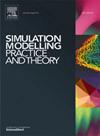一个用于执行TSN调度的新颖的开源框架
IF 3.5
2区 计算机科学
Q2 COMPUTER SCIENCE, INTERDISCIPLINARY APPLICATIONS
引用次数: 0
摘要
由于部署网络的复杂性,以及其NP-complete流量调度问题(Craciunas et al., 2016b),时间敏感网络(TSN)配置在手动完成时容易出错且具有挑战性。我们提出TSNsched,一个用于TSN配置的开源框架。建议的框架具有支持TSN计划的生成、验证和部署的工作流。TSNsched将以流表示的网络逻辑拓扑、时延和抖动需求作为输入,通过将流量调度问题的不同变化形式简化为可以使用可满足模理论(Satisfiability Modulo theories, SMT)求解器自动求解的逻辑理论,生成TSN交换机的调度。TSNsched提供定制的网络模拟器来验证生成的时间表。我们通过示例描述如何使用这些工具工作流来分析、验证和部署TSN配置。本文章由计算机程序翻译,如有差异,请以英文原文为准。
A novel open-source framework for performing TSN schedules
Due to the complexity of deployed networks, as well as its NP-complete traffic scheduling problem (Craciunas et al., 2016b), Time Sensitive Networking (TSN) configuration is error-prone and challenging when done manually. We present TSNsched, an open-source framework for TSN configuration. The proposed framework has workflows that enable the generation, validation, and deployment of TSN schedules. TSNsched takes as input the network logical topology, expressed as flows, its latency and jitter requirements, generating schedules for TSN switches by reducing different variations of traffic scheduling problems to logical theories that can be automatically solved using Satisfiability Modulo Theories (SMT) solvers. TSNsched provides customized network simulators for validation of the generated schedules. We describe by example how these tool workflows can be used to analyze, validate, and deploy TSN configurations.
求助全文
通过发布文献求助,成功后即可免费获取论文全文。
去求助
来源期刊

Simulation Modelling Practice and Theory
工程技术-计算机:跨学科应用
CiteScore
9.80
自引率
4.80%
发文量
142
审稿时长
21 days
期刊介绍:
The journal Simulation Modelling Practice and Theory provides a forum for original, high-quality papers dealing with any aspect of systems simulation and modelling.
The journal aims at being a reference and a powerful tool to all those professionally active and/or interested in the methods and applications of simulation. Submitted papers will be peer reviewed and must significantly contribute to modelling and simulation in general or use modelling and simulation in application areas.
Paper submission is solicited on:
• theoretical aspects of modelling and simulation including formal modelling, model-checking, random number generators, sensitivity analysis, variance reduction techniques, experimental design, meta-modelling, methods and algorithms for validation and verification, selection and comparison procedures etc.;
• methodology and application of modelling and simulation in any area, including computer systems, networks, real-time and embedded systems, mobile and intelligent agents, manufacturing and transportation systems, management, engineering, biomedical engineering, economics, ecology and environment, education, transaction handling, etc.;
• simulation languages and environments including those, specific to distributed computing, grid computing, high performance computers or computer networks, etc.;
• distributed and real-time simulation, simulation interoperability;
• tools for high performance computing simulation, including dedicated architectures and parallel computing.
 求助内容:
求助内容: 应助结果提醒方式:
应助结果提醒方式:


